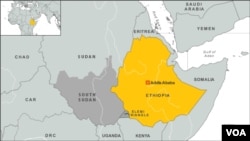The only international observers during Ethiopia’s elections Sunday will be from the African Union, with opposition parties already feeling the AU observers are not demanding enough in their criticism of Ethiopia's election process, which is dominated by the ruling party.
Nine long-term AU observers (LTOs) arrived in April, and another 50 short-term observers arrived last week.
Former Namibian President Hifikepunye Pohamba, head of the mission, commended Ethiopia for being stable and peaceful even while located in a volatile region.
“The National Electoral Board of Ethiopia is appointed by the prime minister and approved by the parliament of Ethiopia. The AU LTOs noted that some interlocutors have expressed the concern in the manner of the appointment of the National Electoral Board of Ethiopia and urged that more political stakeholders be consulted in order for the process to be more transparent and inclusive," Pohamba said.
Anti-terrorism law
The long-term observers also raised concerns about Ethiopia’s anti-terrorism law and how it could be used to undermine freedom of expression and the media’s right to protection of their sources and rights.
The long-term observers of the African Union have so far visited 20 districts in eight regions and will leave after the first week of June.
But opposition parties are not impressed with the African Union observers.
Blue Party spokesman Yonathan Tesfaye said, "We don’t think the AU is an international observer, it’s a legitimacy of dictatorship. It's just a cover. You have the U.S. who refused one way or another, you have the EU who somehow admitted that the previous observations [hadn't] done anything.”
Ethiopia’s last elections in 2010 were observed by a European Union mission. The The ruling Ethiopian People’s Revolutionary Democratic Front (EPRDF) party won those elections in a landslide, taking all but one seat in parliament.
According to a recent European Union statement, the EU decided to sit out this year's elections because its previous recommendations to Ethiopia were not accepted.
Government spokesman Redwan Hussein said there was a difference of opinion between the Ethiopian government and the final recommendations of the EU mission.
'Nothing to do with elections'
“Whatever prescription they made, it had nothing to do with the election. It has to do with the entire democratic system, and legal system and policy issues. So we didn’t subscribe to that subscription because it has nothing to do with elections," Hussein said.
Nearly 37 million Ethiopians are registered for the Sunday elections. More than 5,800 candidates from 58 political parties are running for parliament and regional offices.
Fewew than 1,300 of the candidates are female -- a situation the African Union attributes to a lack of resources and lack of encouragement in Ethiopia's culture.







